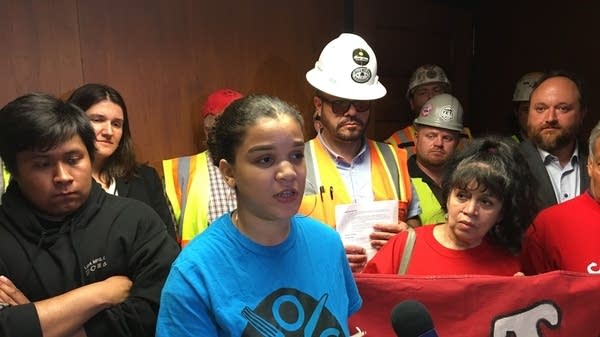Minneapolis moves forward on ordinance aimed at employers who fail to pay
Minneapolis Chamber says a state law and city ordinance may trip up business owners

Go Deeper.
Create an account or log in to save stories.
Like this?
Thanks for liking this story! We have added it to a list of your favorite stories.
A Minneapolis City Council committee has approved a measure to crack down on employers who fail to pay workers wages they’re owed.
At City Hall Monday, dozens of red shirt-clad members of CTUL, a Spanish acronym for the Center of Workers United in Struggle, filled the council chamber to speak in favor of a proposed city ordinance intended to augment the state of Minnesota’s wage theft law that takes effect Thursday.
The new state law says that employers who hold back workers’ pay could face steep fines and even imprisonment.
Two years after she left her job at a child care center in Minneapolis, Juana Cinto has yet to be paid about $1,300 she says her former boss owes her.
Turn Up Your Support
MPR News helps you turn down the noise and build shared understanding. Turn up your support for this public resource and keep trusted journalism accessible to all.
Speaking through an interpreter, the 40-year-old says she received paychecks, but they bounced.
“The owner started giving me checks without funds, so I wasn’t able to cash it,” she said.
Cinto said she tried calling and texting him, but got nowhere, so she went to small claims court. She won a judgment for her back pay, but is still trying to collect.
The state law and Minneapolis’ proposal overlap in many key respects. The ordinance is tailored for the specific needs of the city, and provides a secondary level of enforcement, said council member Phillipe Cunningham, one of the sponsors.
“We have to dig deeper because the challenges we face here in Minneapolis are nuanced and we need to be able to step up and address those nuances to the best of our ability,” he said. “We want to continue to show not only the rest of the state, but the rest of the country how to do this work well.”
Low-wage workers, including many people of color, are the most likely to be victims of wage theft, and the city has an obligation to make sure they’re paid fairly, Cunningham added.
Employers that repeatedly fail to give workers what they’re owed would have to pay double and triple back wages, but city-level sanctions could not be stacked atop any state or federal penalties involving the same worker.
Another provision of the proposal bans employers with outstanding wage obligations from getting city contracts.
Like the state law, the proposed city ordinance requires employers to have new workers sign a statement of employees’ rights. Sean Broom with the Minneapolis Regional Chamber of Commerce doesn’t oppose the measure, but fears business owners may get tripped up by new regulations from two levels of government.
“Wage theft is an abomination. We want to make sure that people earn the wages that they’ve worked for,” Broom said. “But we also want to make sure that we have a regulatory environment in the city of Minneapolis that allows business owners to be successful.”
The wage theft measure is expected to go before the full City Council next week. If passed, the ordinance would take effect Jan. 1.


